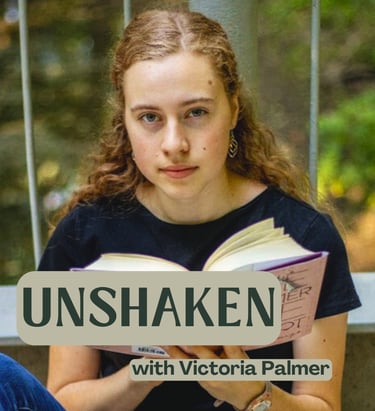Your Guide to Finding & Keeping a Community as an Introverted Adult
4 Tips to help you find and keep a community that will keep you feeling safe and loved - even if you're not sure that's possible.
Victoria Palmer
8/25/20253 min read


Do you ever miss how easy friendships used to be?
When you were little, it just kind of… happened. You saw the same people at school or church every week, you played together, you laughed together, and just like that — you were friends.
But as you grow up, friendships don’t stay that simple. People go off to different colleges, move away, get married, or step into new stages of life. And suddenly, even if you’re still technically friends, the closeness fades. Add to that the challenge of trying to make new friends — whether online, at school, or at church — and it’s easy to feel like you’re on the outside looking in.
If you’ve ever wondered, “How do I even find friends anymore? And once I do, how do I keep them?” — you’re not alone.
My Struggle with Friendship
Even though I’ve lived in the same area and gone to the same tiny church all my life, I’ve still had friendships come and go. Transitioning from being a little girl in that church to being a young woman has been harder than I expected. Most of the women there are 10, 20, or even 50+ years older than me — and I’ve often wondered where I fit.
It can feel lonely when you’re craving friendship and community but not sure how to find it. But over time, I’ve learned a few simple ways to make space for community — no matter what season you’re in.
How to Find and Keep Community as an Adult
1. Look Outside Your Age Group
You don’t need to be best friends with a 45-year-old, but don’t overlook the value of friendships with people who are older or younger than you. A 12-year-old can teach you joy. A 60-year-old can give you wisdom. Community is richer when it’s diverse.
2. Get Involved
Friendships don’t usually fall into your lap — they grow out of shared experiences. Get involved at church, join a small group, volunteer, or sign up for something new. I started teaching Sunday School this year, and it’s been such a sweet way to connect with women on the committee that I otherwise wouldn’t have gotten to know.
3. Understand Different Levels of Friendship
Not everyone is meant to be your “bestie.” And that’s okay. Healthy community has layers. Think of it like circles:
Inner Circle — Your 2–5 closest friends who know almost everything about your life. These are the people you call at midnight.
Outer Circle — Close friends and family you share life with regularly. For me, that’s my family, my husband’s family, and a few good friends.
Community Circle — People you see often at church, in class, or at work. They’re not your inner circle, but they still matter deeply.
Everyone Else — From old college friends to neighbors to that friendly cashier you chat with — these people still play a role in your story.
When you understand these circles, you’ll stop pressuring yourself to make everyone an “inner circle” friend and instead appreciate each connection for what it is.
Final Thoughts
Friendship as an adult isn’t as easy as it was when we were kids. But that doesn’t mean it’s impossible — it just looks different.
God created us for community. Whether it’s through deep inner-circle friendships, wise mentors, or the broader church family, you were never meant to do life alone.
If you’re struggling with loneliness right now, don’t give up. Keep showing up. Keep reaching out. And remember: even if community takes time to build, you are already fully loved and seen by the One who made you.
✨ Want to dive deeper into this topic? I share more of my personal journey and practical steps for building friendships in this week’s podcast episode. You can listen on Spotify here.

